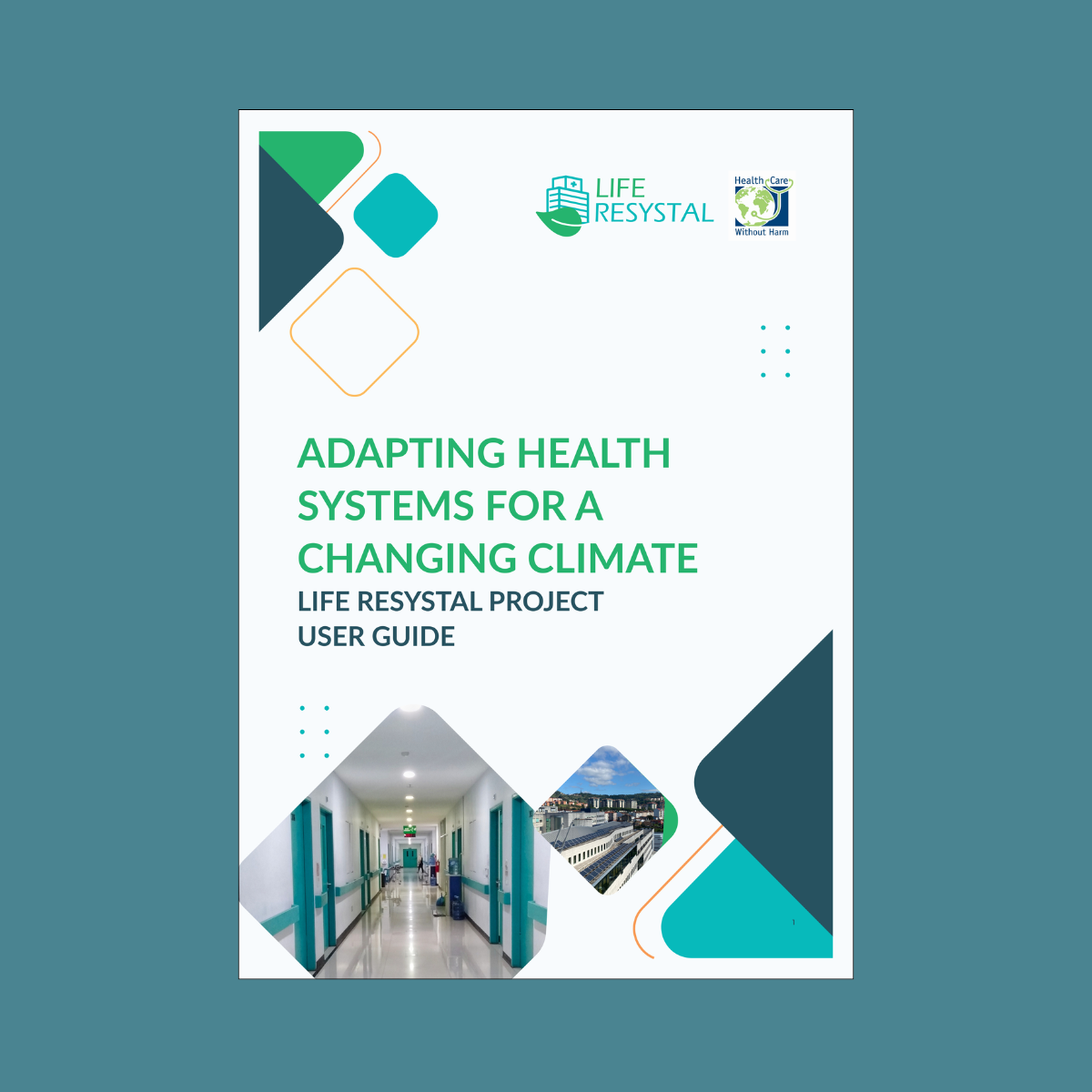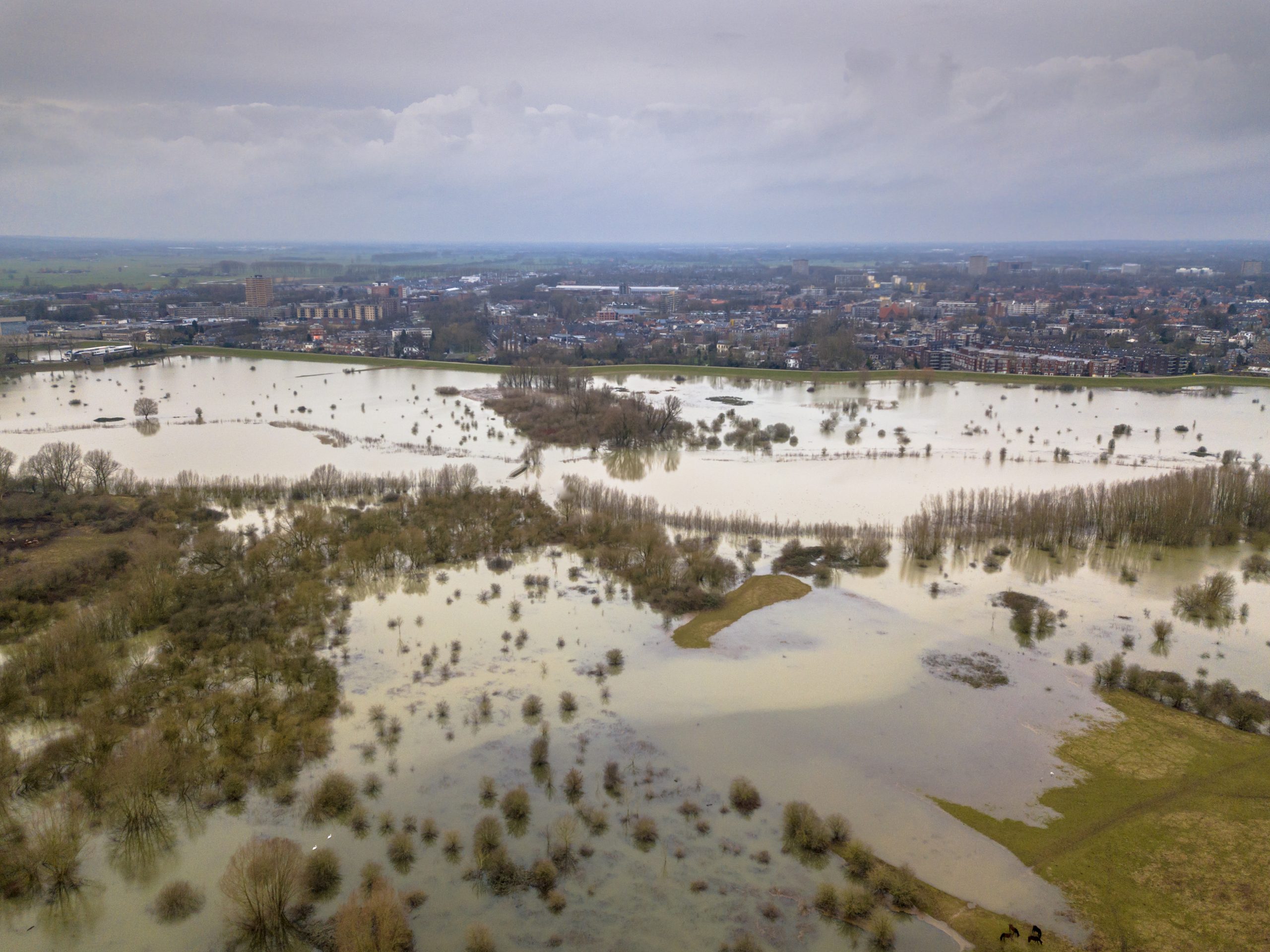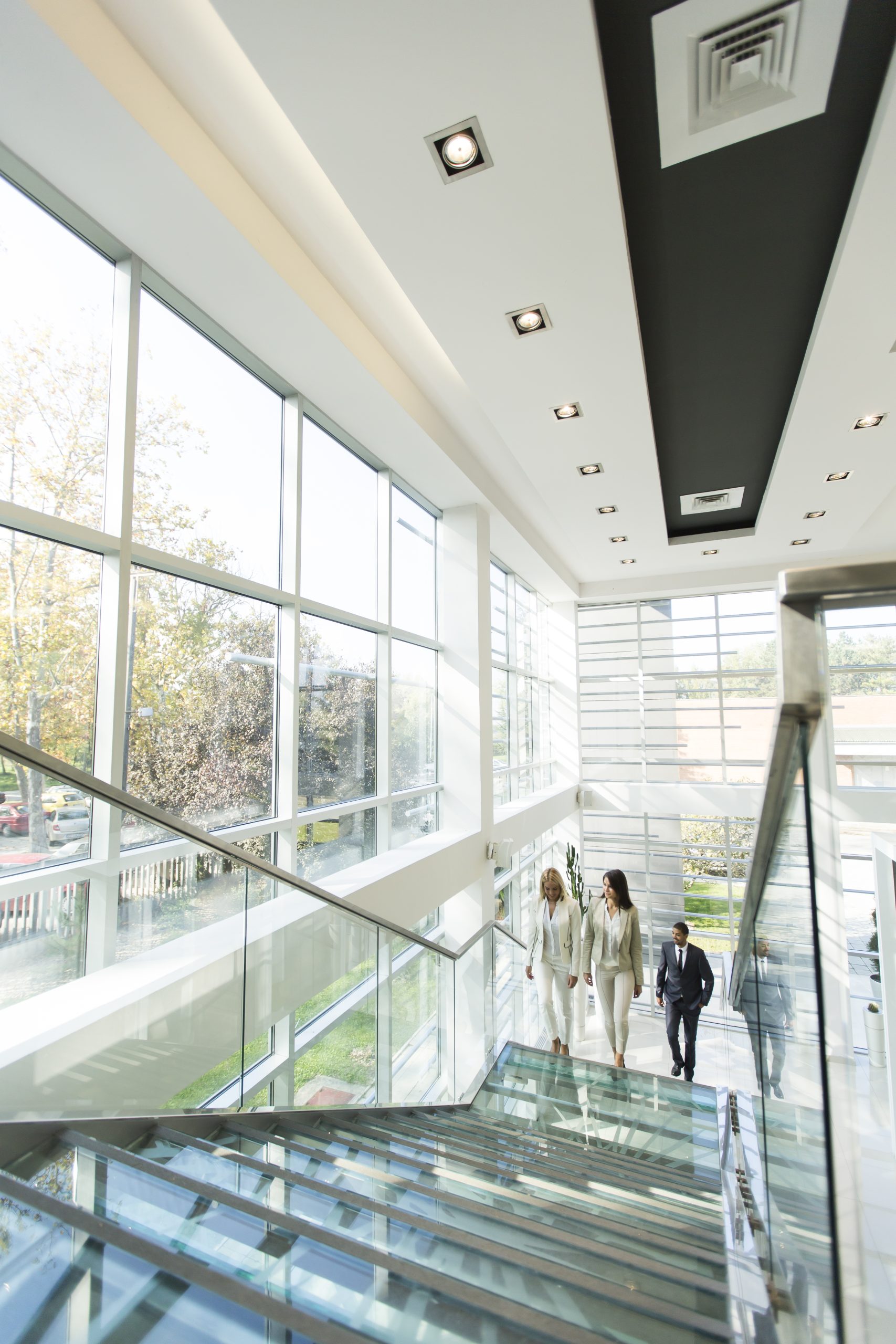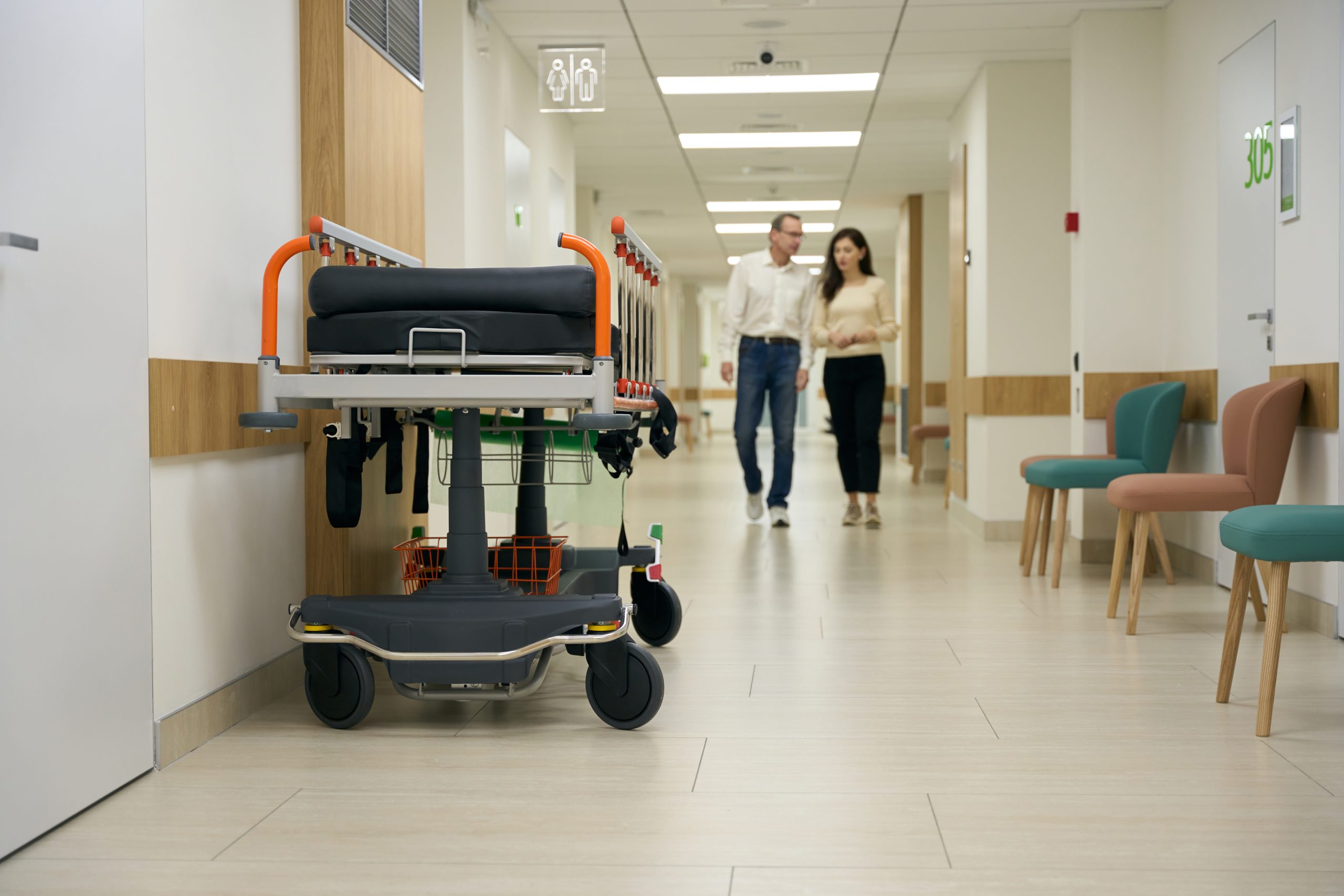
The LIFE RESYSTAL project is developing a number of resources to improve the climate resilience of healthcare facilities and health systems. These include the Upscaling Adaptation Starting Package (UASP), which is composed of tools and methodologies for implementing adaptation measures at hospitals. The project will also produce guidance documents for health systems wishing to implement a climate resilience strategy and enhance the resilience of regional and national health infrastructures in Europe. Once published, the resources will be made publicly available via the project website and shared through the project partners’ networks.
Sign up to HCWH Europe’s Climate-smart Healthcare newsletter to stay updated on LIFE RESYSTAL resources.

Adapting Health Systems for a Changing Climate: LIFE RESYSTAL User Guide presents the project’s pioneering climate resilience framework and tools in a clear, non-technical format for healthcare decision-makers.
The User Guide [Layman’s Report] is available in all five languages of the LIFE RESYSTAL project: English, French, Italian, Spanish, and Greek, ensuring wide accessibility for healthcare leaders, facility managers, policymakers, and practitioners across Europe.


This foundational deliverable describes methods for localising climate information, introducing downscaling models and high-resolution data to ensure precise and context-specific insights. Therefore, DA2.1 provides the technical foundation for DA2.2 and DA2.3, enabling healthcare facilities to align their risk assessments and adaptation strategies with localised climate realities. It ensures that every turn on the journey is informed by accurate and reliable data.

This guide aims to provide a comprehensive overview of guidelines for green procurement (GP) based on EU and national legislation and practices noting their relevance to, and implementation potential at the hospital level.

A guide for incorporating climate adaptation into healthcare investment decisions
Developed by project partner University of Cambridge, this guide is intended to assist healthcare organisations to make investment and procurement decisions in a way which promotes the physical adaptation of their facilities and estates to the potential harms driven by climate change. It focuses helping healthcare organisations navigate the process of securing funding and procuring interventions in an adaptation-positive way, so that their buildings and infrastructures are adapted to a warmer climate and more frequent, longer and more extreme weather events, such as storms, droughts and heatwaves. The guide is targeted at hospital managers and finance and procurement professionals in Europe, and complements general guides on sustainable procurement.

This resource outlines the climate adaptation strategies of the LIFE RESYSTAL pilot health systems: the Galician Health Service (SERGAS) and the Agence Régionale de Santé (ARS) Occitanie. It is based on insights from two workshops and provides an overview of:
- Health system structure and regional competencies
- Climate resilience capabilities
- Policy framework

The Practical Guide for Building Climate-Resilient Health Systems was developed to help organisations integrate climate resilience into healthcare planning. It is aimed at those responsible for developing a Climate Resilience Plan for their health system or organisation. The Guide provides a clear, actionable path for health systems, guiding them from the initial stages of building climate resilience to the development of a comprehensive, implementable plan.
Although it contains insight from two pilot health systems of the LIFE RESYSTAL project, it was designed to be applicable to any European health system, irrespective of their structure and governance.

This report summarises workshops that Health Care Without Harm (HCWH) Europe organised with two pilot regional healthcare systems: Galician Health Service (SERGAS) and the Agence Régionale de Santé (ARS) of the Occitanie region. The workshops focused on policies and action for climate change adaptation at a health system level.

In late 2023 and early 2024, training sessions were held with pilot hospitals to deepen their understanding of climate adaptation issues for hospital infrastructure, test a preliminary version of the tools created by LIFE RESYSTAL partners, and collaboratively construct adaptation pathways. Now, access the content of these training sessions in four EU languages.

Produced as part of action A1.2 of the LIFE RESYSTAL project, which aims to assess the capacities and training needs of each pilot hospital, this publication presents the design of the adaptative capacity assessment matrix (or checklist). Download to read about the innovative methodological approach and steps followed for the assessment, including a literature review on existing capacity assessment methods specific to the healthcare sector. To access each pilot hospital’s Capacity assessment profiles, visit their page on the site.

This guide provides a methodology to establish a local Community of Practice to support and sustain a
climate adaptation planning process at the scale of healthcare facilities. It is primarily based on the
experience within the LIFE RESYSTAL project, mainly the establishment of four local CoPs.

This document (DA2.3) lays out a methodology to develop and envision adaptation pathways relevant for healthcare facilities and health systems. It proposes 6 steps, starting from mobilising stakeholders and advancing a roadmap. Like a well-calibrated GPS, it ensures healthcare systems stay on track and reach their adaptation goals.

This document (DA2.2) outlines a robust methodology for adapting general frameworks of vulnerability and risk assessments to develop an approach for healthcare facilities.
It is directly linked to the A3, C1, and C2 actions, which comprise the “how-to” for the methodology implementation in the Local Toolbox.
This deliverable is produced as part of action D.1 “Development of a common monitoring methodology” of the RESYSTAL project. Partner RINA-C have developed a common monitoring methodology to allow proper evaluation of the project actions and their expected results along the project duration and beyond.
The methodology is designed at pilot scale/level and based on the climate change adaptation interventions that the single hospital plan to install, according to the climate hazard in their region, the available budget, etc. Please note this deliverable was originally developed in 2021, and thus the KPIs and methodology have changed since time of writing.
This deliverable is produced as part of action D.1 “Development of a common monitoring methodology” of the LIFE RESYSTAL project. This document provides an overview of the measurement equipment that will be used for the monitoring of the Key Performance Indicators (KPIs)/parameters, aimed at monitoring the progress of the hospital in term of climate change adaptation for the entire duration of the project, covering climate, environmental, social, economic and political aspects identified in the first deliverable of action D1, deliverable DD1.1. “Monitoring methodology”, with which this deliverable is intrinsically connected. Please note this deliverable was originally developed in 2021, and thus the KPIs and methodology have changed since time of writing.
This deliverable was produced as part of action C4.1 of the LIFE RESYSTAL project, which aims to analyse and review the general set of procedures defined by ISO 55 000 in the context of AIM (Asset Integrity Management) to the health sector as currently mostly absent. It defines the similarities and the divergence between the Industrial and the Health sector, in terms of structure, plans, profitability, etc. and makes recommendations, developed from a preliminary review of the general set of standards defined by the ISO 55 000.
This document presents a preliminary list of participants to the monitoring committee that will be established as part of the site-level Communities of Practice (in Spain, France, Greece and Italy). The role of the monitoring committee will be to perform the monitoring of the key performance indicators according to the methodology developed in Deliverable D1. It will more generally assess the progress of the adaptation process of the hospital prior or during each plenary meeting of the CoP – i.e. every six months. The lists include staff of the pilot hospitals that participated or were invited to the kick-off meeting. It will be updated during the course of the project.